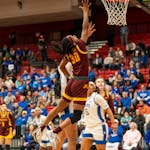 See
more of the story
See
more of the story
On April 8, U.S. Bank Stadium will host the fourth NCAA men's basketball championship game to be played in Minneapolis, following the 1951 game won by Kentucky over Kansas State, the 1992 game won by Duke over Michigan and the 2001 game won by Duke over Arizona.
I am the only columnist to have covered every Final Four here, and the changes that have taken place in college basketball over that span are incredible.
The 1951 championship was played at Williams Arena, and it was the first tournament to have a 16-team field. The tournament didn't have a traditional Final Four, because the semifinals were played at regional sites, but Williams Arena did play host to both a championship, between Kentucky and Kansas State, and a third-place game between Oklahoma A&M (now Oklahoma State) and Washington.
The Kentucky team that won was coached by Adolph Rupp, and that championship was the third of his eventual four national titles.
I knew him well enough that the Minneapolis Lakers would go down to Memorial Coliseum in Lexington and work out against the great Kentucky teams to help develop both clubs.
But at the same time that Rupp was winning that national title, a scandal was breaking about some of his current and former players — including Alex Groza, Bill Spivey, Ralph Beard and Dale Barnstable — who were being indicted for a point-shaving scandal from an NIT game that Kentucky had lost back in 1949.
Different media coverage
The lead-up to the '51 championship here wasn't as big as it is today, but the Star Tribune still covered it in full.
On Monday, March 26, 1951, the day before the title game, the front page of the newspaper had a photo of Spivey, which noted that the 7-foot Kentucky star center was an inch shorter than the new record for winter snowfall, which was set in 1951 at 85 inches.
On the front page of the sports section was a Tribune Wire Services story about the point-shaving scandal, and there was also a large photo of Spivey holding the ball high above the head of Lew Hitch, Kansas State's 6-7 center.
To give you an idea of just how different the attention was around college basketball at the time, a small item on the page noted: "There will be seats on sale at the gate at Williams Arena tonight for the NCAA basketball championship finals, Ike Armstrong, University of Minnesota athletic director, said late Monday. 'The sale was good Monday, but there will be plenty of seats available at Williams Arena Tuesday night.' "
Tickets for the game cost $2.40.
And while the championship and third-place game drew an announced 15,348 fans, it didn't merit front-page news.
A note on the cover of the Star Tribune the next day read:
NCAA FINALS
Kentucky, 68
Kansas State, 58
Details in Sports Section
The story of the game was Spivey. He scored 22 points on 9-for-29 shooting.
Kentucky's 1952-53 canceled
But a note on the bottom of the sports page showed some of the troubles that were coming to Rupp, Kentucky and college basketball.
"Three More CCNY Cagers Arrested, Charged With Fixes of Three Games" read the headline.
Eventually Groza, Spivey, Beard and Barnstable were arrested for taking bribes to shave points.
The investigation found that during the 1950-51 season, when they won the title at Williams Arena, Spivey had shaved points in a 43-42 overtime loss to St. Louis on Dec. 29, one of the Wildcats' two losses that season.
Rupp long denied any knowledge of the point shaving, but the NCAA still eventually banned the Wildcats for the 1952-53 season.
Rupp called me trying to see if he could schedule games against Hamline and other area small colleges. But a few days after that call, Rupp called again and said, "All the Catholic schools want to play us, so we can't be that bad."
In the end, though, the NCAA made sure that Kentucky didn't face a collegiate team in 1952-53.
Rupp got some redemption when Kentucky won the 1958 national championship and Walter Byers — the first executive director of the NCAA, who had given the Wildcats the death penalty for that 1952-53 season — handed Rupp the championship trophy.
The players would be less fortunate.
Maurice Podoloff, the president of the NBA, wanted nothing to do with the scandal. Groza, Spivey, Beard and Barnstable were banned for life, and it didn't matter that these were stars.
Groza had been named the 1949 NBA Rookie of the Year with Indianapolis and averaged 22.5 points per game in his two NBA seasons. Spivey was one of the greatest college centers of all time, and while he tried to clear his name, it never happened and he spent over a decade in the minor leagues. Beard was an NBA All-Star in '51. And Barnstable — who died on Jan. 26 at age 93 — was drafted by the Celtics but never played in the pros.
JOTTINGS
• The Vikings schedule features seven games with teams that reached the 2018 playoffs, and five of those are away from home. Besides facing the Bears twice as usual, the Vikings have a home game against the Eagles and road games against the Chargers, Cowboys, Chiefs and Seahawks.
• It's hard to believe that the Saints signed four former Vikings this offseason in quarterback Teddy Bridgewater, offensive lineman Nick Easton, running back Latavius Murray and punt returner Marcus Sherels. It was reported that the Vikings didn't offer Sherels a contract. Also on the Saints roster is former Gophers tight end Nate Wozniak.
• The Vikings have $5.1 million in salary cap space, which accounts for the $6.9 million they would pay their draft picks. Fortunately they were able to sign safety Anthony Harris, who had a great year in 2018, to a deal.
• Tre Williams of Wasatch Academy in Mount Pleasant, Utah, the lone Gophers men's basketball commitment for this fall, recently was moved up to a four-star recruit by 247Sports. Williams, whose mother, Kelly, played basketball at St. Paul Harding, is now considered the No. 18 shooting guard in the nation.
• The Gophers have three scholarships available for next season, if Amir Coffey doesn't turn pro. While John Marshall star Matthew Hurt still has them on his list of teams, other players they could get are small forward Myron Gardner of Detroit and power forward Isaiah Ihnen of Germany. Ihnen reportedly will visit the Gophers, TCU and Tennessee in April.
• As for Hurt, he said at the McDonald's All-American Game last week in Atlanta that he will announce his college decision on April 19. While Kansas and Duke are the favorites, he was asked by 247Sports on Monday about any other schools with a chance and replied, "I would say Minnesota and Memphis are the two and I wouldn't count them out."
Sid Hartman can be heard on WCCO AM-830 at 8:40 a.m. Monday and Friday, 2 p.m. Friday and 10:30 a.m. Sunday. • shartman@startribune.com





